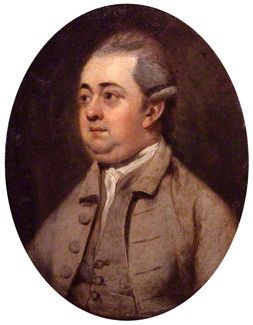
Close to 3 centuries ago this month, on 8 May 1737, Edward Gibbon was born. 51 years later, on 8 May 1788, the last volume of his great history came out. His friends threw him a party in London: “England exult!” they wrote. Britain had given a Newton to science, and a Shakespeare to letters; to history, now it had given Gibbon.
6 years after the Boston Massacre, 3 years after the Boston Tea Party, a year after the battles of Lexington and Concord, and just over 4 months before the Declaration of Independence was adopted, the first volume of The Decline and Fall of the Roman Empire was published. The Decline and Fall of the British Empire was its subject, of course. The grandson of an Edward Gibbon who made, and lost, a fortune in South Sea trade; and the only son of another Edward Gibbon, his profligate heir; this Edward Gibbon, with a little help from his cousin, was elected to the House of Commons in 1774. “I took my seat at the beginning of the memorable contest between Great Britain and America, and supported, with many a sincere and silent vote, the rights, though not, perhaps, the interest, of the mother-country,” he remembered in his Memoirs. In parliament, he was mute. In print, he was not.
“In the second century of the Christian Aera, the empire of Rome comprehended the fairest part of the earth, and the most civilized portion of mankind,” is how Decline and Fall began. “The obedience of the Roman world was uniform, voluntary, and permanent,” it went on. Then came the most famous of all Gibbon's lines. “If a man were called to fix the period in the history of the world, during which the condition of the human race was most happy and prosperous, he would, without hesitation, name that” (c. 1-3). Rome under the Antonine emperors was very much like England, in Gibbon's time.
Then it all came tumbling down. The empire collapsed under its own weight; and hopes for rewards in this life were given up for happiness in the next. Virgin purity and self-mortification took the place of the love of pleasure and action; and in the end, the religion of Constantine conquered Rome. “The clergy successfully preached the doctrines of patience and pusillanimity; the active virtues of society were discouraged; and the last remains of military spirit were buried in the cloyster” (c. 15, 39).
Gibbon read fluently in the languages of history, and spoke with his own voice. But he was wrong about the Antonines. Second-century Roman emperors were as benign as they were weak, but as malicious as they were strong. Only the last Antonine inherited his office, as Marcus Aurelius’ son. As a born emperor, or natus imperator, Commodus liked to have sex—with 600 women in a haul, brought together from every rank and province. And other emperors were no better, before or after. Even Augustus had been asked in a letter: "Does it matter where and in whom you have your erections?" Even Caesar had been in bed with Pompey's wife, and with Crassus' wife, and with Cato's sister, and maybe with Brutus' mother; poets remembered how he and his officers had moved through beds like white cocks or Adonises, "they'd fight over little girls and share them"—as Gibbon would have known, but never wrote. And in the end, as he did admit: “The interior apartments were intrusted to the jealous vigilance of the eunuchs; the increase of whose numbers and influence was the most infallible symptom of the progress of despotism.” So for awhile, history stopped (c. 4, 13).
And Gibbon was wrong about the Church. For centuries before that pure and humble religion had converted men and women around the Mediterranean; for centuries before the banner of the cross was erected on the capitol's ruins; Roman senators had made efforts to push their celibate daughters, younger sons and bastards off into cathedrals and abbeys. And for centuries, Roman emperors had persecuted them for that. “Some were nailed on crosses; others sewn up in the skins of wild beasts, and exposed to the fury of dogs; others again, smeared over with combustible materials, were used as torches to illuminate the darkness," as Gibbon pointed out (c. 16). It wasn’t the cloister that prodded the emperors out of Rome, towards Constantinople. It was Constantine’s move to a more secure capital on the Bosporus that made it possible to leave the Republic of St Peter behind, in the West.
Early on in Decline and Fall, Gibbon hinted that democracy depends on being able to get away from a tyrant. So, on the eve of the American Revolution, it must have seemed. By the time Gibbon celebrated his birthday and the publication of his last volume, in 1787, the savages across the pond had won, and the Treaty of Paris had been signed. But the Roman empire had filled the known world, and escape would have been hard. In the historian's immortal words: “To resist was fatal, and it was impossible to fly” (c. 3).
The reason would be elucidated after another century by Britain’s gift to natural science, Charles Darwin. Who pointed out that, in any society, animals compete. Winners breed. But losers often end up as celibates, or members of sterile castes. Especially where losers are trapped.
REFERENCES:
Gibbon, Edward. 1776-89. The Decline and Fall of the Roman Empire, edited by David Womersley. London: Penguin, 1994.
Gibbon, Edward. 1796. Memoirs, edited by A. O. J. Cockshut and S. Constantine. Hartnolls: Ryburn, 1994.
Betzig, Laura. 2015. Culture. In J. Brockman, This Idea Must Die, pp. 429-31.
Betzig, Laura. In progress. The Badge of Lost Innocence: A History of the West.
WILDCAT WILLY GOT IT RIGHT:


